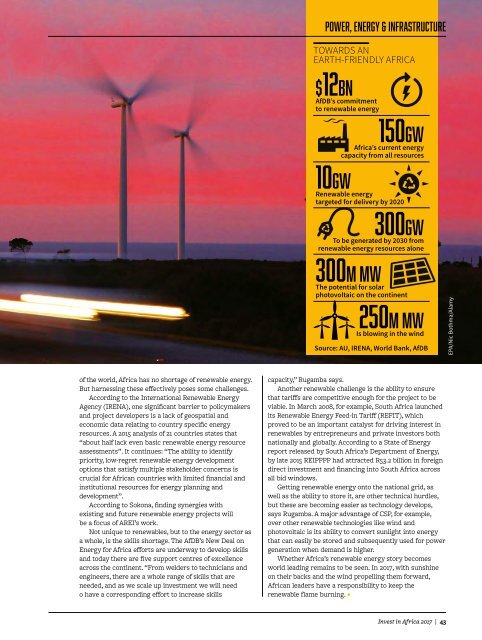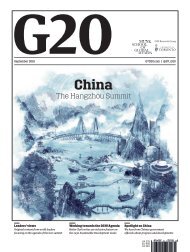Invest in Africa (digital - reduced)
Create successful ePaper yourself
Turn your PDF publications into a flip-book with our unique Google optimized e-Paper software.
POWER, ENERGY & INFRASTRUCTURE<br />
TOWARDS AN<br />
EARTH-FRIENDLY AFRICA<br />
$12bn<br />
AfDB’s commitment<br />
to renewable energy<br />
150GW<br />
<strong>Africa</strong>’s current energy<br />
capacity from all resources<br />
10GW<br />
Renewable energy<br />
targeted for delivery by 2020<br />
300GW<br />
To be generated by 2030 from<br />
renewable energy resources alone<br />
300m MW<br />
The potential for solar<br />
photovoltaic on the cont<strong>in</strong>ent<br />
250m MW<br />
Is blow<strong>in</strong>g <strong>in</strong> the w<strong>in</strong>d<br />
Source: AU, IRENA, World Bank, AfDB<br />
EPA/Nic Bothma/Alamy<br />
of the world, <strong>Africa</strong> has no shortage of renewable energy.<br />
But harness<strong>in</strong>g these effectively poses some challenges.<br />
Accord<strong>in</strong>g to the International Renewable Energy<br />
Agency (IRENA), one significant barrier to policymakers<br />
and project developers is a lack of geospatial and<br />
economic data relat<strong>in</strong>g to country specific energy<br />
resources. A 2015 analysis of 21 countries states that<br />
“about half lack even basic renewable energy resource<br />
assessments”. It cont<strong>in</strong>ues: “The ability to identify<br />
priority, low-regret renewable energy development<br />
options that satisfy multiple stakeholder concerns is<br />
crucial for <strong>Africa</strong>n countries with limited f<strong>in</strong>ancial and<br />
<strong>in</strong>stitutional resources for energy plann<strong>in</strong>g and<br />
development”.<br />
Accord<strong>in</strong>g to Sokona, f<strong>in</strong>d<strong>in</strong>g synergies with<br />
exist<strong>in</strong>g and future renewable energy projects will<br />
be a focus of AREI’s work.<br />
Not unique to renewables, but to the energy sector as<br />
a whole, is the skills shortage. The AfDB’s New Deal on<br />
Energy for <strong>Africa</strong> efforts are underway to develop skills<br />
and today there are five support centres of excellence<br />
across the cont<strong>in</strong>ent. “From welders to technicians and<br />
eng<strong>in</strong>eers, there are a whole range of skills that are<br />
needed, and as we scale up <strong>in</strong>vestment we will need<br />
o have a correspond<strong>in</strong>g effort to <strong>in</strong>crease skills<br />
capacity,” Rugamba says.<br />
Another renewable challenge is the ability to ensure<br />
that tariffs are competitive enough for the project to be<br />
viable. In March 2008, for example, South <strong>Africa</strong> launched<br />
its Renewable Energy Feed-<strong>in</strong> Tariff (REFIT), which<br />
proved to be an important catalyst for driv<strong>in</strong>g <strong>in</strong>terest <strong>in</strong><br />
renewables by entrepreneurs and private <strong>in</strong>vestors both<br />
nationally and globally. Accord<strong>in</strong>g to a State of Energy<br />
report released by South <strong>Africa</strong>’s Department of Energy,<br />
by late 2015 REIPPPP had attracted R53.2 billion <strong>in</strong> foreign<br />
direct <strong>in</strong>vestment and f<strong>in</strong>anc<strong>in</strong>g <strong>in</strong>to South <strong>Africa</strong> across<br />
all bid w<strong>in</strong>dows.<br />
Gett<strong>in</strong>g renewable energy onto the national grid, as<br />
well as the ability to store it, are other technical hurdles,<br />
but these are becom<strong>in</strong>g easier as technology develops,<br />
says Rugamba. A major advantage of CSP, for example,<br />
over other renewable technologies like w<strong>in</strong>d and<br />
photovoltaic is its ability to convert sunlight <strong>in</strong>to energy<br />
that can easily be stored and subsequently used for power<br />
generation when demand is higher.<br />
Whether <strong>Africa</strong>’s renewable energy story becomes<br />
world lead<strong>in</strong>g rema<strong>in</strong>s to be seen. In 2017, with sunsh<strong>in</strong>e<br />
on their backs and the w<strong>in</strong>d propell<strong>in</strong>g them forward,<br />
<strong>Africa</strong>n leaders have a responsibility to keep the<br />
renewable flame burn<strong>in</strong>g. •<br />
<strong>Invest</strong> <strong>in</strong> <strong>Africa</strong> 2017 | 43
















